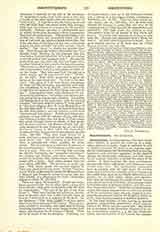

Constitutions, ECCLESIASTICAL.—The term constitution denotes, in general, the makeup of a body, either physical or moral. Used in reference to civil or religious societies, the word, in the singular, signifies the fundamental law determining their governing, legislative, and executive organism; in the plural it denotes the enactments, ordinances, and laws issued by the supreme authority to further the object of the society. In legal language the term constitutiones denotes only church ordinances, civil ordinances being termed leges, laws. The constitutiones ecclesiasticae have in common with the leges civiles the binding power derived from the authority of their framers, but they differ from them as the Church differs from civil society, viz. in their origin, object, and sanction.
Civil laws are enactments of a power directly human and only Divine in its first cause; their primary object is the furtherance of temporal welfare; and their sanction, temporal penalties. Ecclesiastical constitutions, on the other hand, emanate from an authority directly of Divine institution; their ultimate object is to promote the salvation of souls in the Kingdom of God on honor of some saint or in memory of the dead. On earth; their sanction consists in spiritual penalties.
In the total complex of laws bearing on matters spiritual, ecclesiastical constitutions stand midway between the Divine and the natural law. The Divine is contained in the Scriptures interpreted by living, authoritative tradition, e.g. the Ten Commandments, the constitutions of the Church, the administration of the sacraments. Natural law rests on the dictates of human reason, e.g. the law of self-preservation, obedience to authority, Divine worship. Both the Divine and the natural laws are often insufficiently determined; the Church expounds them and adapts them to particular times, places, and persons. Chief among ecclesiastical constitutions are the ordinances emanating from general councils (see Councils, General, X, XI) and from the Apostolic See (see Papal Constitutions); these are the constitutions ecclesiasticae in the strictest sense of the term. Episcopal constitutions are issued by bishops either singly or assembled in synods, e.g. the constitutions of the ten provincial and three plenary councils of Baltimore, which have adapted the ancient constitutions of the Universal Church to the peculiar national and political situation of the United States of America.
J. WILHELM

